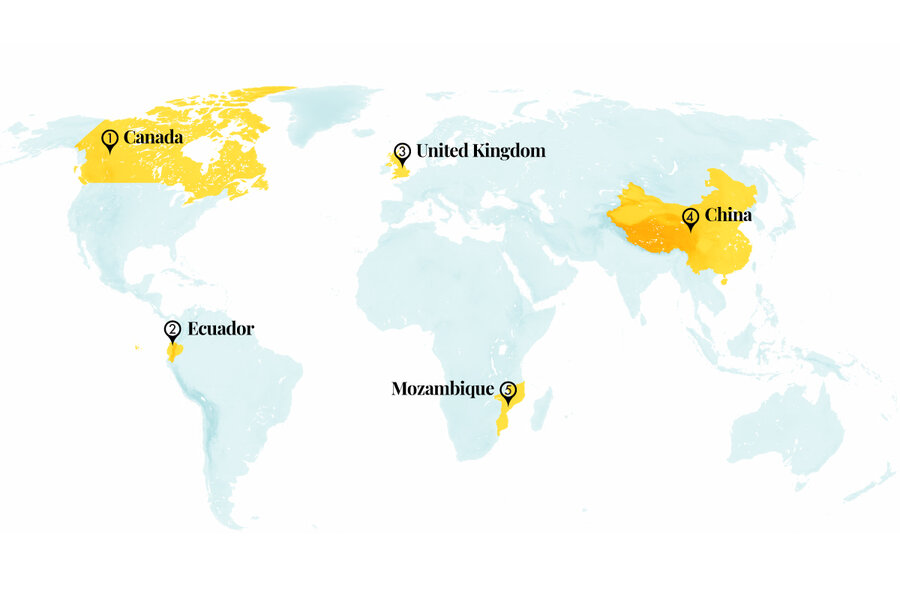A chance to grow: How China and a British town are sowing seeds
Loading...
1. Canada
Canada’s Supreme Court is majority-female for the first time. Prime Minister Justin Trudeau chose Mary Moreau to replace a retiring justice, giving the court five female and four male members.
Ms. Moreau most recently served as chief justice of Alberta’s superior court and has been a judge for 29 years. As a lawyer she first became known as a defender of French-language rights and has practiced criminal law, constitutional law, and civil litigation. She’s “somebody who is determined to make changes, but within the existing structures,” said Justice Karen Horner, an Alberta colleague.
Why We Wrote This
In our progress roundup, government attentiveness to people’s needs means gardeners in a British town can farm underused land. And for countries where China is invested in the local talent, job training benefits both sides of the equation.
Previous appointments by Mr. Trudeau have also expanded the diversity of Canada’s top court. In 2021, Mahmud Jamal, who was born in Kenya to parents from India, became the first nonwhite person to sit on the court. And a year later, Michelle O’Bonsawin became the court’s first Indigenous jurist.
Sources: The Globe and Mail, The Guardian, Canadian Broadcasting Corp.
2. Ecuador
Researchers used sound analysis to demonstrate the recovery of tropical forests in biodiverse northeast Ecuador. While reforestation aids in climate change mitigation as the newer trees capture carbon, it can be difficult to determine if animals are also rebounding alongside flora. But using a combination of acoustic monitoring, artificial intelligence tools, and DNA-based surveys, scientists in Ecuador’s Chocó rainforest found that species do return to regenerating forests.
The team examined a variety of land types across 43 plots, from farmland to old-growth forests. Employing recordings of ambient noise, one analysis used a deep-learning model trained on 75 bird sounds, which greatly added to the information that expert human ears alone can detect. Another analysis combined several acoustic indices, which summarize information from soundscapes and are often used as a proxy for biodiversity. The team also analyzed DNA from trapped bugs to estimate the diversity of insects present.
The researchers stress the cost effectiveness of sound data, encouraging the further development of machine learning tools that process animal sounds other than birds’. Passive sound monitoring of conservation areas can even help prevent greenwashing by companies and contribute to evidence-informed conservation funding, they wrote.
Sources: Mongabay, Nature Communications
3. United Kingdom
Hull will become the first city in Britain to give people the “right to grow” food on unused land. In a unanimous vote, Hull’s City Council passed a motion permitting community organizations, charities, and small groups of neighbors to cultivate fruit and vegetables on underutilized public spaces. Advocates say the move will promote healthy local foods and increase food security. The motion comes amid skyrocketing demand for allotments – small parcels of land for gardening that local authorities across the U.K. have been required by law to rent to residents since the early 20th century.
The City Council will create a map of the land it owns and help those wishing to grow their own food overcome practical obstacles, such as meeting insurance requirements and providing water for the plants. Incredible Edible, a network of 150 community growing groups, has advocated for a national “right to grow” law.
“It will benefit Hull in many ways,” said local councilor Gill Kennett of the plan. “We do need cheap food. In terms of mental health benefits, growing food gives people ... confidence, it ticks so many boxes.”
Source: The Guardian
4. China
Chinese technical schools are educating specialized workers in some two dozen locations in Africa and beyond. Since 2016, China’s Luban Workshops have graduated thousands of students in fields ranging from railway operations to robotics and artificial intelligence. Named for a master carpenter from the fourth century B.C., the workshops provide equipment and free training to local residents on how to work with Chinese-owned technology. In September, a new workshop opened at Meru University of Science and Technology in Kenya.
Observers say that as an international program, the workshops mark a change in how China is spreading its influence and a signal that China has listened to its critics. The Belt and Road Initiative, the developing-world infrastructure projects led by China, has been criticized for relying heavily on Chinese labor and materials. The Confucius Institutes, roughly 500 programs that sought to teach Mandarin around the world, have been scrutinized for the academic environment created by largely Chinese-educated faculty. But the Luban Workshops have avoided such criticism by working closely with local authorities and tailoring curricula to the needs of the location.
Sources: The Economist, The Washington Post
5. Mozambique
Lions are returning to parts of Africa, thanks to “landscape mosaics” and public-private cooperation enabling better conservation. The lion population has plummeted to around 20,000, and its historical habitat has shrunk by more than 90%. But work across borders among conservationists, park staff, and landowners to connect patches of land has created ecological corridors and given the big cats the vast stretches they need to roam and reclaim places where they have not been seen in years.
Zinave National Park in Mozambique, which forms the eastern slice of the Great Limpopo Transfrontier Conservation Area in southern Africa, was devastated after 15 years of civil war. But in 2021, after several years of reintroducing animals to the park, a camera trap spotted a lion. Since lions had not yet been reintroduced, it must have migrated hundreds of miles across the conservation area. Nature preserves have also found success in Chad, where not all the corridors are formally protected, but male lions are using them as they search for territory.
Other parks, such as Kafue National Park in Zambia, use similar approaches. Conservationists emphasize that their work includes supporting communities in these areas to reduce conflict between humans and wildlife.
Source: Mongabay











